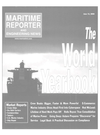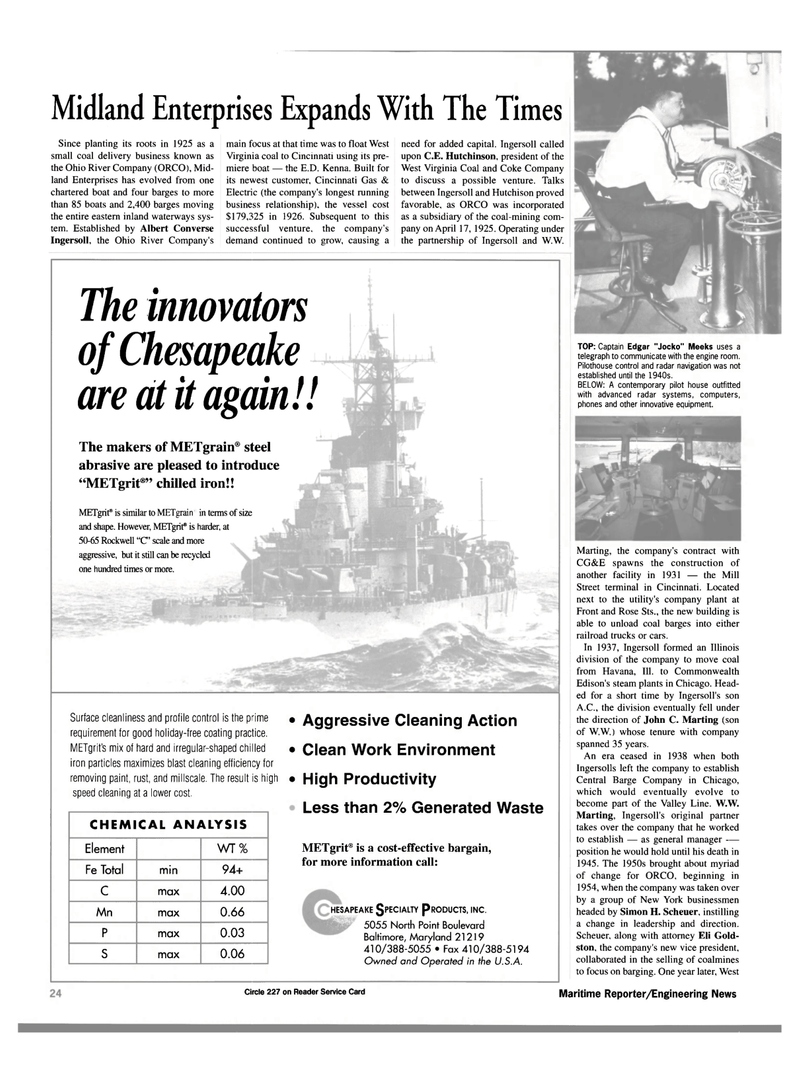
Page 24: of Maritime Reporter Magazine (June 15, 2000)
Read this page in Pdf, Flash or Html5 edition of June 15, 2000 Maritime Reporter Magazine
Circle 227 on Reader Service Card
TOP: Captain Edgar "Jocko" Meeks uses a telegraph to communicate with the engine room.
Pilothouse control and radar navigation was not established until the 1940s.
BELOW: A contemporary pilot house outfitted with advanced radar systems, computers, phones and other innovative equipment.
Marting, the company's contract with
CG&E spawns the construction of another facility in 1931 — the Mill
Street terminal in Cincinnati. Located next to the utility's company plant at
Front and Rose Sts., the new building is able to unload coal barges into either railroad trucks or cars.
In 1937, Ingersoll formed an Illinois division of the company to move coal from Havana, 111. to Commonwealth
Edison's steam plants in Chicago. Head- ed for a short time by Ingersoll's son
A.C., the division eventually fell under the direction of John C. Marting (son of W.W.) whose tenure with company spanned 35 years.
An era ceased in 1938 when both
Ingersolls left the company to establish
Central Barge Company in Chicago, which would eventually evolve to become part of the Valley Line. W.W.
Marting, Ingersoll's original partner takes over the company that he worked to establish — as general manager — position he would hold until his death in 1945. The 1950s brought about myriad of change for ORCO, beginning in 1954, when the company was taken over by a group of New York businessmen headed by Simon H. Scheuer, instilling a change in leadership and direction.
Scheuer, along with attorney Eli Gold- ston, the company's new vice president, collaborated in the selling of coalmines to focus on barging. One year later, West
Maritime Reporter/Engineering News
Midland Enterprises Expands With The Times
Since planting its roots in 1925 as a small coal delivery business known as the Ohio River Company (ORCO), Mid- land Enterprises has evolved from one chartered boat and four barges to more than 85 boats and 2,400 barges moving the entire eastern inland waterways sys- tem. Established by Albert Converse
Ingersoll, the Ohio River Company's main focus at that time was to float West
Virginia coal to Cincinnati using its pre- miere boat — the E.D. Kenna. Built for its newest customer, Cincinnati Gas &
Electric (the company's longest running business relationship), the vessel cost $179,325 in 1926. Subsequent to this successful venture, the company's demand continued to grow, causing a need for added capital. Ingersoll called upon C.E. Hutchinson, president of the
West Virginia Coal and Coke Company to discuss a possible venture. Talks between Ingersoll and Hutchison proved favorable, as ORCO was incorporated as a subsidiary of the coal-mining com- pany on April 17, 1925. Operating under the partnership of Ingersoll and W.W.
Surface cleanliness and profile control is the prime • requirement for good holiday-free coating practice.
METgrit's mix of hard and irregular-shaped chilled • iron particles maximizes blast cleaning efficiency for removing paint, rust, and millscale. The result is high • speed cleaning at a lower cost.
CHEMICAL ANALYSIS
Element WT %
Fe Total min 94+
C max 4.00
Mn max 0.66
P max 0.03
S max 0.06
Aggressive Cleaning Action
Clean Work Environment
High Productivity
Less than 2% Generated Waste
METgrit® is a cost-effective bargain, for more information call:
HESAPEAKE SPECIALTY PRODUCTS, INC. 5055 North Point Boulevard
Baltimore, Maryland 21219 410/388-5055 • Fax 410/388-5194
Owned and Operated in the U.S.A.
The innovators of Chesapeake are at it again!!
The makers of METgrain® steel abrasive are pleased to introduce "METgrit®" chilled iron!!
METgrit® is similar to METgrain in terms of size and shape. However, METgrit® is harder, at 50-65 Rockwell "C" scale and more aggressive, but it still can be recycled one hundred times or more.

 23
23

 25
25
